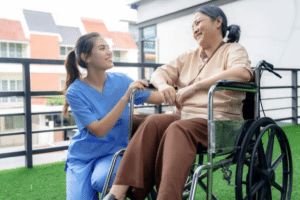
If your loved one is scheduled for surgery, you generally depend on the doctors and nurses at the hospital to make sure she gets everything she needs for recovery. You trust them to feed her the proper meals, provide the proper medication, and guide her in the proper follow-up treatment. If they do their job well, you simply need to visit your loved one. You can enjoy spending time with her and encouraging her to feel better soon.
But once your loved one does feel well enough to return home, then those tasks of continuing to help her body heal as it needs may fall upon you. You might be the one who has to encourage her to walk when she doesn’t. To help her bathe when she can’t. Or to prepare meals that are beneficial to her recovery. It can all seem a bit overwhelming.
One way you can help both your loved one and yourself is to consider hiring a post-hospital care provider to assist in those days (or weeks) following surgery. With a post-hospital care provider, you’ll receive peace of mind that your loved one has someone skilled in recovery visit her each day. You can also take the time to help your loved one recover in non-medical ways. You might find that is much more comfortable for you.
Let the post-hospital care provider help with wound care and prescription management so that you can take care of these three areas with your loved one’s recovery without getting too burned out:
- Meals. After your loved one has surgery, what she eats matters more than ever. Her body can use certain nutrients and vitamins to repair itself more quickly. Her diet will be what gives the body the fuel it needs to recover. Look for foods that are rich in protein, vitamin C, and iron to combat fatigue and promote healing. Also, look to increase her probiotic and fiber levels to ensure her body is processing the food well.
- Exercise. While a post-hospital home care provider might be able to help with PT or OT after surgery, you can help by encouraging walks around the neighborhood or at the local gym. Go slow and remind her to pay attention when she’s getting fatigued but if you keep it up every day, she’ll see those energy levels return to normal in no time.
- Distractions. Recovery can be slow and sometimes quite boring. If your loved one is required to rest a lot, now is the time you can break out the games. You can also look through old photo albums together or pop some popcorn and put those old family movies on. This will not only distract your loved one from her discomfort but also help you connect. While recovery is never fun, it does open the door to intentional connection opportunities for you and your family. Take advantage of those moments and you both might find that her recovery will speed along.
If you or an aging loved one are considering Post-Hospital Care in Hillsborough, CA, please contact the caring staff at Aviva In-Home Care today (415) 463-1400
Aviva In-Home Care provides exceptional senior home care in the Bay Area, including San Francisco, Burlingame, San Mateo, Hillsborough, Atherton, Menlo Park, Palo Alto, Berkeley, Lafayette, Orinda, and surrounding areas.
- What You Should Know About Caring For A Parent With Alzheimer’s - May 23, 2025
- How To Help Your Senior Parent Feel Their Best Every Day - May 14, 2025
- Preventing Falls in the Yard - May 6, 2025




